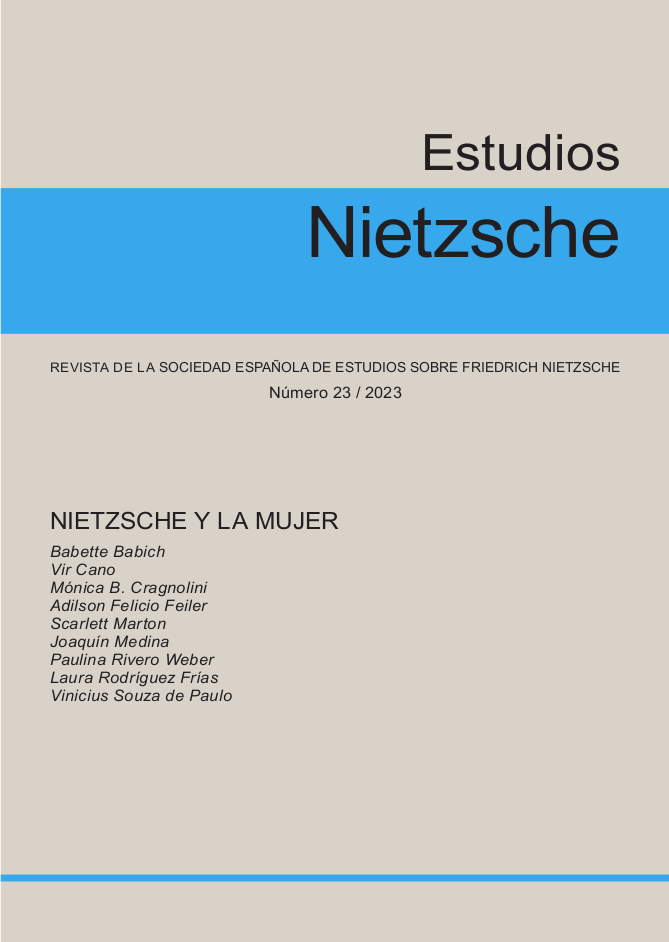Nietzsche confronts the free woman: The enigmas of the (dis)encounter with Lou von Salomé
DOI:
https://doi.org/10.24310/EstudiosNIETen.vi23.15816Keywords:
Loy von Salomé, freedom, idiosyncracy, heoricAbstract
This article aims to explore the main aspects of Friedrich Nietzsche's (dis) encounter with Lou von Salomé. Although the relationship between these two intellectuals takes place in just a few months in 1882, the influence that each of them exerted on the life of the other, as well as the first-hand information that Lou can provide about Nietzsche, make this encounter essential to understand the philosopher's thoughts from his most human side. Through the analysis of the similarities and differences between these two personalities, a thought they both share is fulfilled: to study simultaneously an author and their work.
Downloads
Metrics
References
ANDREAS-SALOMÉ, L., Mirada retrospectiva. Compendio de algunos recuerdos de la vida, Madrid: Alianza, 2018.
Friedrich Nietzsche en sus obras, Barcelona: Minúscula, 2005.
CAMPIONI, G., Nietzsche: crítica de la moral heroica, Córdoba: Brujas, 2020.
DIETHE, C., «Lou Salomé’s Interpretation of Nietzsche’s Religiosity», en Journal of Nietzsche Studies, no 19, 2000, pp. 80-88.
D’IORIO, P., «Die Schreib- und Gedankengänge des Wanderers. Eine digitale genetische Nietzsche-Edition», en Editio, vol. 31, no 1, 2017, pp. 191-204.
GARCÍA PARDO, P., Vida y obra de Lou Andreas Salomé. Una aportación al estudio psicoanalítico de la feminidad, Madrid: U. Complutense de Madrid, 2009.
GONZÁLEZ, A., El pensamiento filosófico de Lou Andreas-Salomé, Madrid: Cátedra, 1997.
JANZ, C. P., Friedrich Nietzsche. Vol. I. Infancia y juventud, Madrid: Alianza, 1981. Friedrich Nietzsche. Vol II. Los diez años de Basilea (1869-1879), Madrid: Alianza, 1981.
MÜLLER-LAUTER, W. Y GRIFFIN, DREW E., «Nietzsche’s Teaching of Will to Power», en Journal of Nietzsche Studies, no 4/5, 1992, pp. 37-101.
NIETZSCHE, F., Obras Completas. Escritos de madurez II y Complementos a la edición. Vol. IV, D. Sánchez Meca (dir.), Madrid: Tecnos, 2016.
NIETZSCHE, F., Obras Completas. Escritos de madurez I. Vol. III, D. Sánchez Meca (dir.), Madrid: Tecnos, 2014.
NIETZSCHE, F., Correspondencia IV. Enero 1880 – Diciembre 1884, L. E. de Santiago Guervós (dir.), Madrid: Trotta, 2010.
NIETZSCHE, F., Fragmentos póstumos. Vol. III (1882-1885), D. Sánchez Meca (dir.), Madrid: Tecnos, 2010.
NIETZSCHE, F., Digitale Kritische Gesamtausgabe, Werke und Briefe [eKGWB], París: Nietzsche Source, 2009 ss. Herausgegeben von P. D’Iorio. Recuperado de .
NIETZSCHE, F., Fragmentos póstumos. Vol. II (1875-1882), D. Sánchez Meca (dir.), Madrid: Tecnos, 2008.
NIETZSCHE, F., Fragmentos póstumos. Vol. IV (1885-1889), D. Sánchez Meca (dir.), Madrid: Tecnos, 2006.
NIETZSCHE, F., V. SALOMÉ, L., RÉE, P., Documentos de un encuentro, Torrazza Piemonte: Laertes, 2021.
MONS, I., Lou Andreas-Salomé. Una mujer libre, Barcelona: Acantilado, 2019.
PETERS, H. F., My Sister, My Spouse. A biography of Lou Andreas-Salomé, New York: The Norton Library, 1974.
WOTTLING, P., La philosophie de l’esprit libre. Introduction à Nietzsche, París: Flammarion, 2008.
Downloads
Published
How to Cite
Issue
Section
License
As of issue 21 (2021) this journal is published only in open access (diamond route).
From that number 21, like the previous numbers published in NIETZSCHE STUDIES, they are subject to the Creative Commons Acknowledgment-NoComercia-ShareIgual 4.0 license, the full text of which can be consulted at <http://creativecommons.org/licenses/by-nc-sa/4.0 >
It is the responsibility of the authors to obtain the necessary permissions of the images that are subject to copyright.
This work is licensed under a Creative Commons Attribution-NonCommercial-ShareAlike 4.0 International License.
Copyright generates two different rights: moral rights and patrimonial rights that EJFB recognizes and respects. Moral rights are those relating to the recognition of the authorship. They are rights of a personal nature that are perpetual, inalienable, unseizable and imprescriptible as consequence of the indivisible union of the author and his/her work.
Patrimonial rights are those that can be derived from the reproduction, distribution, adaptation or communication of the work, among others.







11.png)
